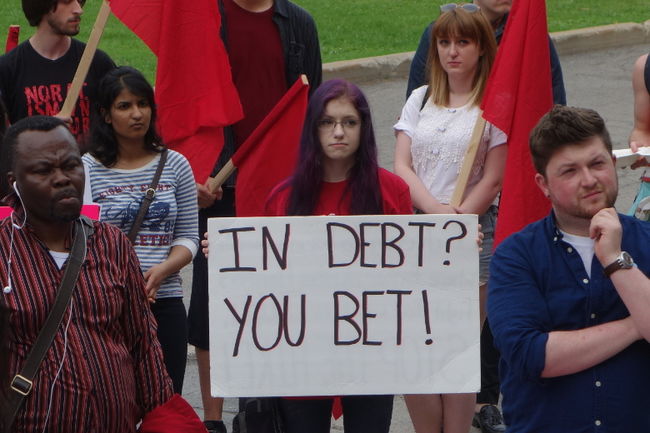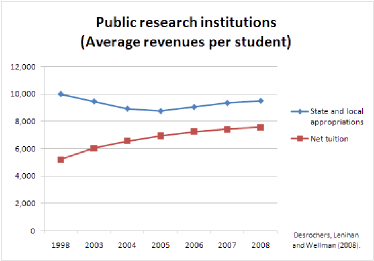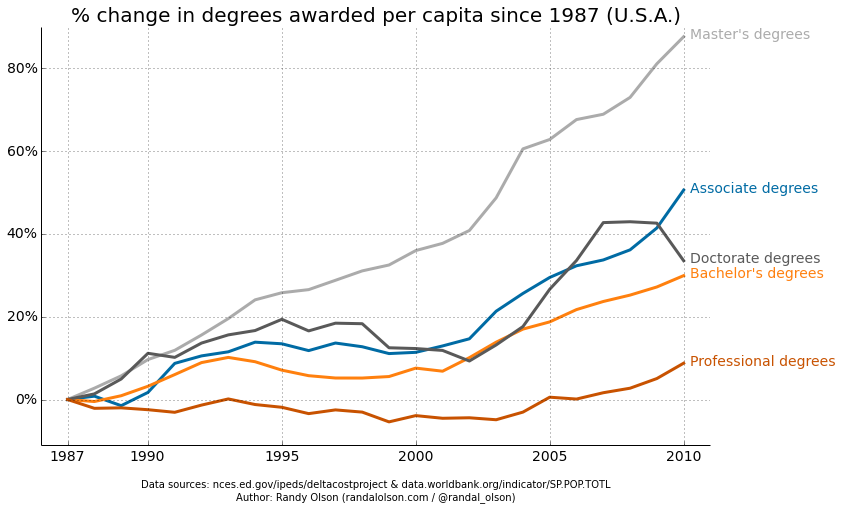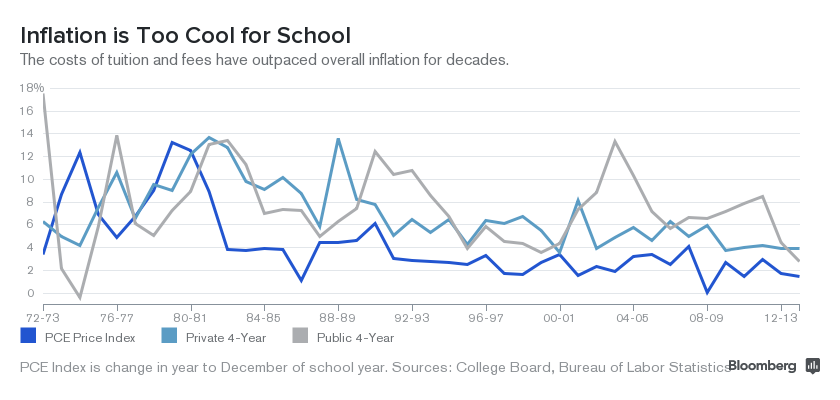
MOOCs vs College Degrees
Massive Online Open Courses (MOOCs) are miles ahead of their rapidly aging predecessor, the unJustifiably Overpriced Collegiate Experience (uJOCE). We will compare and contrast the two in this article, weaving a neat little story about finances, economics, and information in the meantime.
MOOCs Are Awesome!
Oftentimes, I find myself taking classes taught by the most famous people in their respective fields (cough, Dan Ariely) and from Ivy League universities (who pioneered MOOCs in the first place). Best of all, it’s FREE.
In this digital age,
when information is at everyone’s fingertips, the cost of education is really just to have some crisp organization, superior tutelage, educational experiences, and maybe journal access. Yet all of these costs are falling with the advent of new technologies. Info is organized, communications are cheaper, experience is more transferable, and journals are edging toward open access.
The Internet is democratizing the long-insular education industry and causing it to restructure its bloated costs. Did you know all of that hefty tuition money is supplemented with big, fat stipends, grants, and loans from the government? Of course you do. A few less of us appreciate that the average salary of a $69,911 annually for an associate professor (6 years of training + approximately that annual stipend in total loans). Even a full professor, an enviable position many on-track never reach, still has an median annual income just under 6-figures while taking orders from an obese C-suite of deans that rarely settle below $200,000. (More shocks and maths here.)
The Price isn’t Right
Odd choice of priority, you might say or think to yourself, that professors are so unrewarded despite being the backbone of the whole notion of a college. Curious, you may think as you squint to read this little line graph, considering the fact the both tuition and government funding have been increasing steadily since 2005. My, how the costs of higher education must have increased despite the cheapening of information!
Perhaps its the baffling system of credit that causes perpetual inflation of the currency. A quick look toward our friends at Bloomberg seem to indicate the college expenses have been hovering above an economic indicator of inflation since the 80’s. So, the cost of college certainly has been increasing nicely within its own little industry.
According to economic theory, meteoric costs in education should be associated with some corresponding increase in value. That is Economics 101, right? If the degree isn’t more valuable, then perhaps fewer degrees are being issued. (Either the demand is higher or the supply is lower, either one enhancing value to the consumer.)

Scarcely without a degree

On the left, you see a lovely line graph depicting the percent growth of various kinds of higher-learning degrees since 1987, measured per capita. (Thank you to brilliant Randal Olson!) In addition to an increase in the overall number of people per 100,000 holding degrees, we see that all degrees have upticked a few times since 1987. Indeed, it would appear that higher education in the US is more common today than it has been in the past (at least back to 1987). So, the supply is growing, though the price is increasing… which necessitates an increase in demand, if we’re following the rules.
Value your time and money
Surely, education is the best investment. It seems probable that the value of a degree is increasing. A more competitive job market, conditions we’re certainly aware of, could lead to such a thing. It could very well be the case that degrees lead to career outcomes with more cash, even that this disparity between degree-holders and less qualified applicants has grown over time.
It could be that collegiate operational costs have increased. Perhaps expensive technological instrumentation that wasn’t available or useful to learn in the past has impacted the bottom line. Maybe some sort of challenging organizational inefficiency has caused the skyrocketing relative pay of administrators in an attempt to really hone in on the best business problem-solvers.
Being outside the industry myself it is hard to understand the forces conspiring toward this increase in tuition and taxpayer subsidies. Does that mean there is nothing more to say?
Occam’s Razor
Well, frankly, it is apparent when approaches the Gordian knot of ecological variables that the web cannot be unspun. Instead, we must make like T. Paine and use our incredible capacities for common sense to slice the web of lies apart.
Of course, myriad factors may be compensating in all sorts of magickal ways. Many will work their statistical wizardry to tell you exactly tha,t and there is rarely so rich a subject as “estimating the value of a degree”. You don’t need to be a scientist to run the empirical lens by that farce to determine that there are quite a few variables to factor in, not to mention plenty of ripe cherries for the picking.
Yet, imagine an alternative. How about… a Massive Open Online Course? How much quality is lost in this format over the traditional course and how much money would have to be added to recreate that original value? This provides us with the means to compare the going-rate for the uni-treatment versus an up-and-coming competitor. Almost sounds like… capitalism.
MOOCs aren’t free.
To put things into perspective, most MOOCs begin with a robust seeding: edX got $60million at the get-go, Udacity $22m, and Coursera $16m. Big numbers, certainly. Yet these universities serve 50,000 students in an average class, bringing the per student rate far below a traditional university. While it is impossible to honestly calculate out every fee and expense for taking a university class, the pricing schedule is usually quite straightforward for an online course: a sign-up fee (often gratis), a course fee (typically $0-$300), and/or a certificate fee (usually optional) to verify that you completed the course as promised.
A college university can run anywhere between $200 to $900 per credit hour, of which there generally three hours per course. This puts the minimum course at around $600, which is certainly the high-end of MOOC pricing. What value is added to the university experience? Peers, personal attention, and presentations are a few. While it is possible to roughly calculate out these expenses as well, I will not exhaust you on such details. Instead, I will only note that the $600-$2700 price tag rarely includes these exciting auxiliary features: the rooming, boarding, feeding, and breathing fees can easily multiply tuition by anywhere from 1.3 to 2 for the typical student.
Altogether, let’s assume the worst and best case scenarios based on these numbers for a 120-credit-hour degree, assuming each class is three credit hours. In the best case ($200/credit-hour and extra fees at only 1/3 of tuition), we arrive at a clean $32,000; in the worse case ($900/credit-hour and 2x tuition in fees), we have $216,000. For our MOOC courses, ranging from $0-300, we have a corresponding best and worst range for 40 unique classes from totally free to $12,000.
MOOCs are free markets.
How can that be so much cheaper? Where are these additional fees in the traditional university model, sneaking in to destroy the value of our hard fought-for college degrees? I submit to you that the entire difference may lie in the inevitable corruption of an industry divorced from its market.
The free-market requires freedom. The unjustified allocation of resources based on politics, ploys, and parties is ultimately the seed of destruction for sane economics. This has been exactly the case for collegiate universities in the US for just long-enough that we are starting to sense some absurdity. For example, did you know that student loan debt in the US in 2013 hovered between $902 Billion and $1 Trillion, with at least 86% belonging to Uncle Sam’s lending program?
This perverse incentive to please the government (the primary payer of most higher education institutions) has caused the education industry to sour. Instead of finding value for the consumer (i.e., the means to make more money in the future or to have a more fulfilling life), colleges are incentivized to attract higher volumes of students who qualify for loans and then to cater to their short-term satisfaction through amenities, athletics, and events. Not that such treats lack value for the consumer, yet they may not stack up to their dollar value if compared to market rates (one might buy many gym memberships, football tickets, and art admissions for $200,000).
Yet this inefficiency, waste, and corruption is disguised by the industry consensus and commonly perceived necessity of college degrees. In an economy where corporate jobs are increasingly undesirable or disappearing, what might some ink and parchment really afford oneself? It would appear that we’re sliding back into an era of normalcy, where applied knowledge trumps the superficial vestiges of authority.
What’s Next?
Education is crucial for self-development and the ability to harness one’s true capacities. Gatekeepers in all of the interesting industries are going to ask for your credentials up front, and it is hard to cough up sheepskin without help. Yet, “help” in the form of a loan is not help at all. Indeed, we needn’t consult a senechal to recognize that debt is a ball-and-chain that is specifically designed to prey upon those with insufficient capital to meet tempting investments with large overheads.
Instead, it is time to embrace the disruptive solution that turns the education industry reeling.
MOOCs mean real knowledge transmitted from qualified experts to actually engaged students.
We can abandon the follies of the past. We can embrace honesty, efficiency, and action to transform society’s embarrassing mistakes into the soil of our golden future.
First, we can acknowledge informal learning as legitimate. This could easily involve the creation of multitudinous testing agencies for different industries or even in-house aptitude tests for new hires. I venture that as college degrees becomes associated with poor financial planning and the skills of the self-taught enter the job market, applicant selection will have more to do with demonstrable skills and works than with letters or proxied prestige.
Secondly, we can seek employment in industries that rely on feats of skill rather than politics. I make no differentiation between hard or soft skills, nor even the literal notion of politics. I mean to draw your attention to what careers are immune to shifts in the command of authority. If you can make yourself invaluable to your employer, then they will remain beholden. Some fail to realize that the opposite is true as well, such as when enslaved by debt one is fearful of leaving an abusive employer, so the greater demand for your skills the better.
Finally, work for yourself. Many people hate seeking employment, yet this is when you actively influence how your peers value you and your contribution. The rewards for increasing your value to yourself, your company, and your society are severely stunted when in a position of employment. By taking responsibility for your role in life, you will find that the incentives cascade and converge with your own sense of personal fulfillment. Most importantly, it secures you a connection to the people you influence the most: your clients. This does not call for an economy of freelancers: no, it simply requires the flattening of the corporate hierarchy such that everyone is given equal respect. At will contract work with multiple clients enriches both all parties through inter-industry experience and direct appeals to expertise.
MOOCs vs College Degrees
The question isn’t resolved. There are plenty of jobs that absolutely require participation in this high-cost circus. I hope to have stretched the horizon a little today, however, and invite you to have a little piece of the golden future today, even if it features a little hill climbing.


